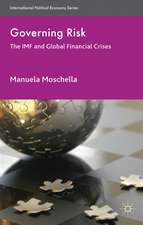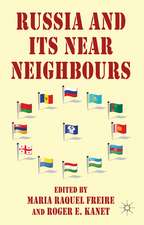Russia-Cyprus Relations: A Pragmatic Idealist Perspective
Autor Costas Melakopidesen Limba Engleză Paperback – 8 mar 2018
| Toate formatele și edițiile | Preț | Express |
|---|---|---|
| Paperback (1) | 381.59 lei 6-8 săpt. | |
| Palgrave Macmillan UK – 8 mar 2018 | 381.59 lei 6-8 săpt. | |
| Hardback (1) | 387.58 lei 6-8 săpt. | |
| Palgrave Macmillan UK – 12 feb 2016 | 387.58 lei 6-8 săpt. |
Preț: 381.59 lei
Nou
Puncte Express: 572
Preț estimativ în valută:
73.04€ • 76.74$ • 61.38£
73.04€ • 76.74$ • 61.38£
Carte tipărită la comandă
Livrare economică 11-25 martie
Preluare comenzi: 021 569.72.76
Specificații
ISBN-13: 9781349674602
ISBN-10: 1349674605
Pagini: 211
Ilustrații: X, 211 p.
Dimensiuni: 140 x 216 mm
Greutate: 0.26 kg
Ediția:1st ed. 2016
Editura: Palgrave Macmillan UK
Colecția Palgrave Macmillan
Locul publicării:London, United Kingdom
ISBN-10: 1349674605
Pagini: 211
Ilustrații: X, 211 p.
Dimensiuni: 140 x 216 mm
Greutate: 0.26 kg
Ediția:1st ed. 2016
Editura: Palgrave Macmillan UK
Colecția Palgrave Macmillan
Locul publicării:London, United Kingdom
Cuprins
1. The 'Pragmatic-Idealist' Logic of the Book
2. The Cyprus Problem, International Law, and the Annan Plan
3. Revisiting Pragmatic Idealism
4. Moscow's Policies towards Cyprus during the Cold War: Realpolitik versus Latent Pragmatic Idealism
5. Russia and Cyprus, 1991-2012: Pragmatic Idealism versus Realpolitik
6. Nicos Anastasiades' First Two Years in Power
7. The Russo-Turkish Labyrinth and the Cyprus-Israel-Egypt-Greece Rapprochement
8. The Russo-Cypriot Prospects
2. The Cyprus Problem, International Law, and the Annan Plan
3. Revisiting Pragmatic Idealism
4. Moscow's Policies towards Cyprus during the Cold War: Realpolitik versus Latent Pragmatic Idealism
5. Russia and Cyprus, 1991-2012: Pragmatic Idealism versus Realpolitik
6. Nicos Anastasiades' First Two Years in Power
7. The Russo-Turkish Labyrinth and the Cyprus-Israel-Egypt-Greece Rapprochement
8. The Russo-Cypriot Prospects
Recenzii
“Costas Melakopides’s Russia-Cyprus Relations: A Pragmatic Idealist Perspective, deals with a subject that has been overlooked in contemporary geopolitical literature. Through a chronological examination of the relationship between Russia and Cyprus, Melakopides attempts to make a strong statement on two levels. First, he provides a distinct theoretical insight into the motivations driving Russian foreign policy in the region, and second, he juxtaposes the Russian approach to that of Britain and the United States.” (Petros Vamvakas, Mediterranean Quarterly, June, 2017)
Notă biografică
Costas Melakopides studied law, philosophy and politics in Greece, England and Canada before teaching International Relations. He joined the University of Cyprus as Assistant and Associate Professor (1996-2010). Since retiring from teaching, he has continued researching and publishing on the Cyprus problem; Greek-Turkish relations; EU-Cyprus relations; international ethics; and Russia-Cyprus relations. He has published numerous books, co-edited volumes, and journal articles.
Textul de pe ultima copertă
This study assesses Moscow's special bilateral relations with Cyprus since the mid-1950s, with particular emphasis on the post-Cold War years. Melakopides develops the theory of 'pragmatic idealism' when describing the way in which Moscow's Cyprus policies were meant to satisfy not only mutual interests but also international legal and ethical principles and norms. The book recalls Cyprus's dramatic vicissitudes since the 1950s and revisits the controversial 'political realist' policies of Washington, Ankara and London against the interests and needs of the Greek-Cypriot majority. Melakopides then goes on to analyse the regional geopolitical context; Turkey's hegemonic ambitions and its ongoing aggressiveness against Cyprus; Nicosia's current efforts to pursue a multidimensional foreign policy that also engages Greece, Israel and Egypt; the strong Russian-Cypriot diplomatic and political relations as well as their relations in trade, banking, energy, tourism, culture, energy and defence; and the origins of Russia's historical, religious and 'spiritual' sentiments and bonds towards Hellenism and Cyprus.














